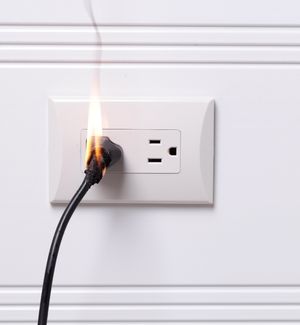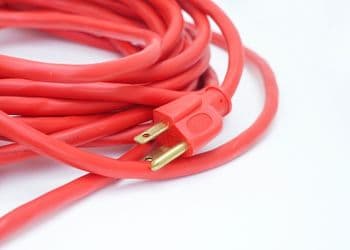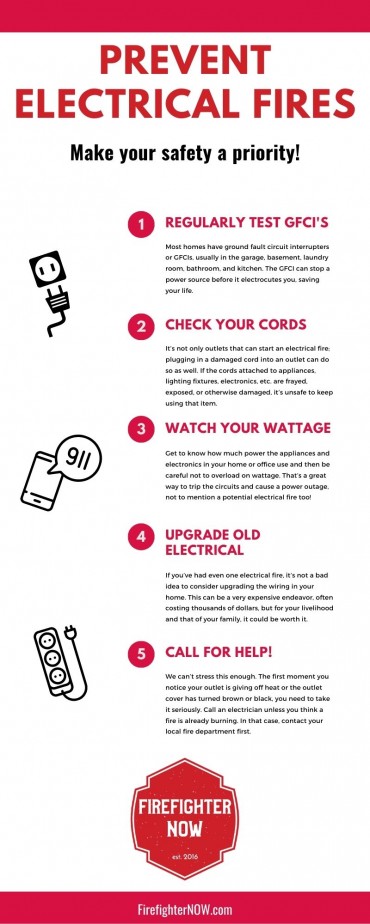Do you smell that? An odd odor around the house can make you nervous, especially if the smell just won’t go away. If you suspect an electrical fire in your home, what would it smell like?

Electrical fires tend to smell like burning plastic, so they have a telltale acrid odor. Others say the scent is reminiscent of fish. That said, electrical fires don’t always produce an odor. In that case, you’d have to listen for a buzzing sound or check for a brown outlet cover.
In this article, we’ll talk further about the smell of an electrical fire. We’ll also delve into the causes of these fires, what you should do if your home has an electrical fire, and how to prevent them. We have lots of useful info ahead, so keep reading!
Table of Contents
Why Does an Electrical Fire Smell?
An electrical fire occurs when circuit breakers, cables, or electric wires malfunction or fail. Since they often start behind a wall, you can’t rely on seeing the fire alone as a telltale sign of an electrical fire. Rather, in some cases, an unappealing odor will be a giveaway that something’s wrong.
Electrical fires will smell like one of two things. The first is an acrid odor that’s like burning plastic. This makes sense because, behind your wall, plastic components like wire coatings could be on fire.
Others say an electrical fire has a fishy scent. If your home smells more like fish than it does burning plastic, then this is a sign that the electrical fire has likely just started. The fish odor occurs when electrical parts overheat but perhaps have not yet begun burning.
That said, it’s easy to attribute a fishy odor to something you cooked for dinner last night rather than an issue with your home’s wiring. A plastic burning scent is a little bit harder to write off.
We do want to note one thing. Electrical fires do not always give off an odor that’s fishy or otherwise. In that case, the fire can burn for quite a while unmitigated. Fortunately, you can detect an electrical fire in plenty of other ways, and we’ll talk about those a little later.
What Causes Electrical Fires?
Electrical fires are in their own class, and it’s not a Class A through F (they’re technically called Electrical Fires). Unlike fires started from flammable metals or gases, an electrical fire can ignite through causes not your own.
Here are some situations in which an electrical fire might break out.
Old Wiring
The wiring throughout your home doesn’t stay in good shape forever. If more than two decades have passed without any updates to the wiring, it’s a good idea to get an electrician out to your home to inspect the condition of your wiring.
The older that wiring is, the less capable it is of withstanding the electrical load that today’s homes require. A circuit can overload, reaching the breakers. If your breaker box is as ancient as your wiring is, the breaker box can overheat and eventually ignite.
Improper Space Heater Usage
Do you have a space heater or several in your home? Many are on wheels or are otherwise portable for warmth in your house no matter where you need it.
However, anytime you use a space heater, you’re supposed to take certain precautions. For instance, the space heater should not be running too close to carpeting, furniture, chairs, clothing, beds, and curtains.
As the space heater generates heat, its proximity to the above items could cause them to catch on fire. Those items are very flammable, after all!
Faulty Extension Cords
Extension cords are very convenient, but they can become dangerous if you misuse them. You should not put extension cords under furniture or carpeting, for instance. You’re also never supposed to connect several extension cords, which is known as daisy-chaining.

If you have an indoor extension cord, it should stay exclusively indoors and not go outside. You also shouldn’t modify an extension cord, such as taking out its grounding pin so it fits into a two-pronged outlet. These habits can all cause fires.
Lighting Fixtures Are Over Wattage
Your table lamp can cause a fire if it’s running over wattage. All light bulbs have a recommended wattage range, as do lighting fixtures. Once you exceed that range, the bulb could explode, or the lamp or lighting fixture can ignite.
Signs of an Electrical Fire (Besides a Bad Smell)
As promised, let’s take a closer look at the potential signs you might see or experience if an electrical fire occurs in your home or at work. Do keep in mind that symptoms of an electrical fire can and do vary.
Buzzing Sound
The next time you’re home, turn off all the televisions and video games and ask your family to stay silent. Then, walk throughout the house, going into every room on each floor. Do you hear a consistent buzzing sound? Is that sound louder in some parts of the house and fainter in others?
Can you explain the source of the sound? If you answered no, then you very could have an electrical fire burning behind the walls.
Dimming Lights
Unless your home has a dimmer switch, then your lights shouldn’t be dimming on their own. The same goes for flickering, which is always a sign of trouble. More than likely, a space heater or faulty appliance is drawing too much power, which is causing your lights to go dim. Those appliances could become troublesome and even cause an electrical fire down the line.
Breakers Trip Often
Your breakers will trip as a precaution, usually due to a damaged part, a power surge, or a very strong current. This is something that will happen from time to time and usually isn’t a sign of something more serious.
That said, if your breakers trip all the time, then you need to pay attention, as something is clearly wrong. Your wiring could have a short, or the appliances on a circuit are using too much juice. Without being addressed, an electrical fire could be imminent.
Electrical Sparking
Here’s a sign that’s a lot harder to ignore. Outlets, fuse boxes, and breaker panels that begin sparking require immediate attention, so call your electrician right away. If it’s only an appliance or electronic that’s sparking, it’s still not good, but it could just be that the appliance is damaged.
Discolored Switches and Outlets
When you get some time, take a look at the switches and outlets throughout your home. Most of them are probably white. If the color is now brownish or black, that’s a sign that the wiring within is faulty or you’re overloading that outlet or switch. A fire could already be burning without you knowing.
Hot Switch Plates and Outlets
From hair dryers to toaster ovens, although these items heat up, their outlets should always be cool to the touch (or at least not hot). When the switch plates and outlets themselves are overheating, that could be indicative of bad wiring that might eventually start a fire.
What To Do If You Experience an Electrical Fire?
To reiterate, electrical fires do not always have overt signs, including both visual and olfactory ones. That said, if you’re reasonably sure your home or workplace is amid an electrical fire, here’s what you should do.
Exit the Home or Building
Whether you see outlet discoloration, smell a fishy odor, or notice that several outlets are hot, now is not the time to stick around. As we’ve discussed, electrical fires often occur behind the walls where you cannot see them.
You need to exit the premises immediately before the fire spreads and potentially becomes more serious.
Call Emergency Services
Although your home or office will need the attention of an electrician, if you suspect that an electrical fire is burning, then it’s dangerous to send an electrician in. You instead need your local fire department.

Once you’ve gotten a reasonable distance away from the burning home or building, dial your local emergency number (such as 911) and calmly explain the situation. Make sure you give your address clearly. Firefighters will be dispatched to your location immediately.
The firefighters will enter the home or building upon arriving. They can use such methods as chemical tests, satellite imagery, and more to determine where the fire is coming from. The firefighters will work expediently to put out the fire and preserve as much of the structure as possible.
Contact Your Electrician
Once the dust has settled (figuratively, we hope) and the fire department has finished extinguishing the fire in your home or workplace, it’s time to contact an electrician to get the wiring repaired or redone.
Are Electrical Fires Deadly?
Since you can’t always see electrical fires, that can cause their seriousness to be downplayed. However, just because you can’t see them doesn’t mean an electrical fire isn’t a threat. If anything, these fires might be even deadlier than your average Class A or Class F fire for the very reason that you can’t see them.
About 1,100 people are injured from electrical fires and 310 people are killed. That’s 310 needless deaths and thousands of more needless injuries.
Now that you know the signs of an electrical fire, if you spot one or more of those signs, you should not ignore them. Electrical fires are rarely visible and don’t always produce a smell, but they’re still fires at the end of the day. Without intervention by a fire department, the fire can turn deadly.
How to Prevent Electrical Fires
Whether at work or at home, there are things you can do every day and every year to ward off electrical fires. Here are our top tips.

Call for Help at the First Sign of Trouble
We can’t stress this enough. The first moment you notice your outlet is giving off heat or the outlet cover has turned brown or black, you need to take it seriously. Call an electrician unless you think a fire is already burning. In that case, contact your local fire department first.
Test Your GFCIs Every Month
Most homes have ground fault circuit interrupters or GFCIs, usually in the garage, basement, laundry room, bathroom, and kitchen. The GFCI can stop a power source before it electrocutes you, saving your life.
Well, only if it works, that is. Once every month, test your GFCI. To do that, push the button labeled TEST. This should disable the power to the GFCI. After that, take an item like a radio or a lamp and plug one into each GFCI outlet. Neither item should get power.
That’s the test. Unplug the items, press the RESET button on the GFCI outlet, and it should work as normal.
Check Your Cords
It’s not only outlets that can start an electrical fire; plugging in a damaged cord into an outlet can do so as well. If the cords attached to appliances, lighting fixtures, electronics, etc. are frayed, exposed, or otherwise damaged, it’s unsafe to keep using that item.
Don’t Overload Wattage
Get to know how much power the appliances and electronics in your home or office use and then be careful not to overload on wattage. That’s a great way to trip the circuits and cause a power outage, not to mention a potential electrical fire too!
Consider an Electrical Wiring Upgrade
If you’ve had even one electrical fire, it’s not a bad idea to consider upgrading the wiring in your home. This can be a very expensive endeavor, often costing thousands of dollars, but for your livelihood and that of your family, it could be worth it.
Electrical fires don’t always smell, but when they do, it’s an odor like fish or burning plastic. Even though you rarely see them (since they occur behind walls in your home), electrical fires can be deadly, as they kill about 300 people a year.
Take heed of the tips in this article and safeguard your home as best you can against electrical fires!